By: debbie lynn elias
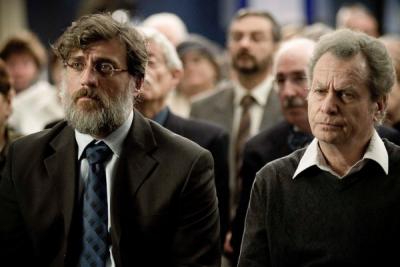
2012 Academy Awards Best Foreign Language Film nominee and Film Independent Spirit Award nominee, FOOTNOTE is a poignant, witty, well crafted film that employs exemplary cinematography and visual metaphoric reference set to a score that soars with lyricism and emotion, setting the tone for the non-Hebrew speaking audience. Written and directed by Joseph Cedar, FOOTNOTE showcases the fun and foibles of the human condition, to a richly textured and satisfying result.
At the heart of the story is the Israel Prize. Given since 1953 in four different categories, the Prize honors (1) Jewish studies, social sciences and humanities, (2) cultural arts, (3) natural sciences and (4) lifetime achievement to the betterment of the nation.
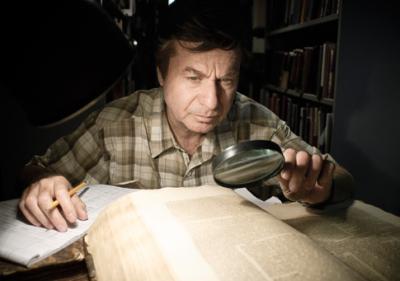
Eliezer Shkolnik has spent his life working on Talmudic manuscripts. Scrutinizing every millimeter of thousands of pages, every ink blot or mark, his life’s work has been spent authenticating the texts. So devoted to his work, he doesn’t leave the office in his home but to go to the library. He doesn’t socialize. He doesn’t even notice his wife but for when she turns the tv on too loudly, forcing him to put on headphones in order to concentrate on the meticulous tedium of his work.
Then we have Eliezer’s son, Uriel. Also a Talmudic scholar, he has spent his time writing commercially and academically successful books on Judaism and the Jewish tradition. An outgoing man, he enjoys lecturing and unlike his father, has the social graces and personality his father sorely lacks. This combination has led him to be the recipient of an esteemed award, an award that Eliezer frowns upon, believing the reward is in the work, not in false accolades. But as he is watching Eliezer, one can’t help but see the Green Monster of Envy rear its ugly head within Eliezer’s soul. He is jealous of the attention his son is getting for being “flippity” while he is ignored for his serious studies! There is an unspoken rivalry bubbling that has been brewing for decades!
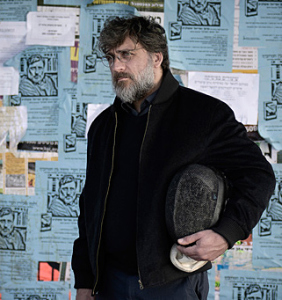
That rivalry is about to appear front and center in the father-son relationship when Eliezer is notified that he has won the Israel Prize. Elated and ecstatic, Eliezer’s joy – and arrogance – is uncontainable as he brandishes an “I told you so” to all who know him; including Uriel. With his father throwing the prize in his face, Uriel soon finds himself in a crisis of conscience.
Called to a secret meeting by the awards committee, Uriel learns a truth both pleasant and ugly. The committee made a mistake. They left the message for the wrong Shkolnik. It is, in fact, Uriel, who has won the prize, not his father. Enraged, Uriel vehemently argues with the committee, trying to persuade them to give Eliezer the honor which he so richly deserves for his decades of work. And while Uriel argues so passionately on his father’s behalf, Eliezer is doing a tv interview lambasting Uriel over the inconsequential work that he has been doing, deeming it “not important” and “undignified.”
The father-son relationship is perfectly positioned and will really resonate thanks to Lior Ashkenazi’s Uriel. He takes Uriel on this bumpy character journey and is fantastic at conveying angst, fatherly fear, frustration, exasperation and crossroads confusion, all which these great facial expressions. Schlomo Bar Alba’s Eliezer reminds me of a dirty old man. Grumpy but with lifelong little quirks that make him endearing…like wearing his sneakers and carrying dress shoes in a plastic bag.
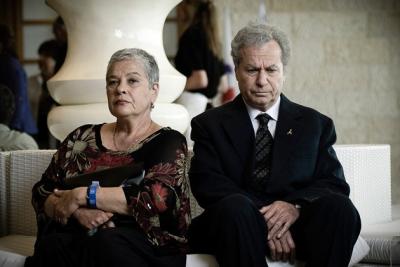
Written and directed by Joseph Cedar, I found myself amazed at how absorbed I was in the story and the textures of the relationship between father and son. Similarly, the detail into the world of academia is presented so as to hold fascination for those unfamiliar. The sense of irony is brilliantly crafted, surrounding us in 360 degrees of resonating emotion. And never for a second do you not believe that Eliezer and Uriel are father and son.
Technically, FOOTNOTE is flawless, particularly with Yaron Scharf’s cinematography. The use of color and lighting juxtapositioned against hallways and tiny rooms (which provide some very Marx Brothers style comedy) works perfectly in creating the intricate metaphoric visuals created through production design. Truly “cinematic art” in its styling and choreographed lensing, FOOTNOTE is visually stunning thanks to the meticulous and exacting detail of each and every scene compliments of attention to detail with the minutiae of the elements within every scene.
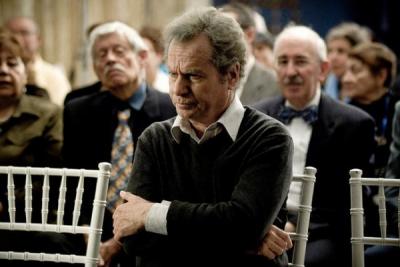
One particularly outstanding sequence showcases a cavernous, architecturally layered white corridor in which we find Eliezer walking through, almost as if following the light during death as one walk towards God. There is no dialogue, only the visual which is humorous, tense and poignant.
A word that consistently comes to mind in describing FOOTNOTE is “lyrical”. Be it the score, the camera work, the editing, the emotion. Never have I experienced a film with such a lyrical quality to it. Quite honestly, the editing of FOOTNOTE is so superb, so lyrical, that I would have submitted it for Oscar consideration for Best Editing outside of Best Foreign Language Film.
Adit Poznansky’s score is magical. One minute you feel as if in the middle of Hitchcock’s PSYCHO, the next minute awash in Disney’s FANTASIA with Mickey and his buckets of water. The score is the heart and emotion of the film, fueling the story and driving it home.
Written and Directed by Joseph Cedar.











